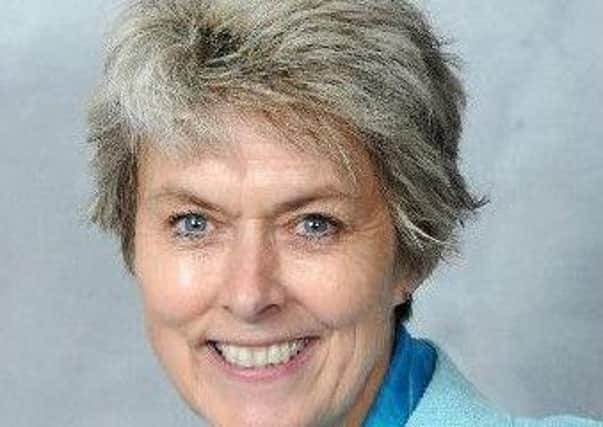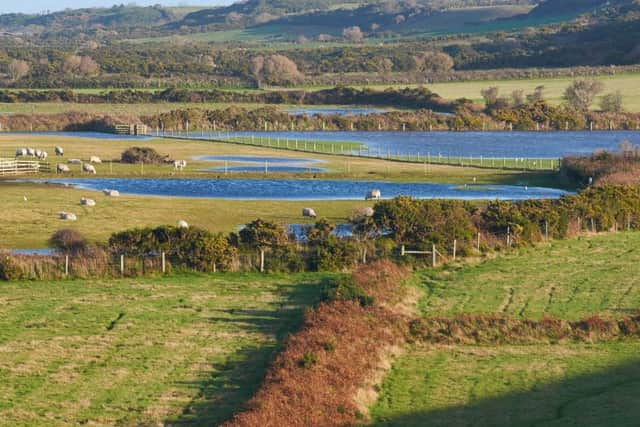Anne McIntosh: Rural flood issue's national implications


A low level of sterling against the euro and the US dollar means the pound in your pocket is worth less and buys less in shops. Spending by tourists appears to exceed that by locals. While this might be good news for exporters, costs of imported materials used in locally-produced goods go up. Latest figures show only a small reduction in the UK’s trade deficit since June.
This matters to Yorkshire’s rural heartlands and beyond. We are only 62 per cent self-sufficient in food production. That makes us very reliant on food imports which, in turn, pushes up the cost of food in the shops.
Advertisement
Hide AdAdvertisement
Hide AdGovernment measures to boost exports are welcome and already producing results in countries such as China, but these take time. Until the imbalance in food imports/exports is redressed, there will be an ongoing trade deficit and I hope Ministers will acknowledge this.


In the short term, the low value of the pound has meant an increase in basic farm payments for farmers, but these would cease on Britain leaving the EU in 2019.
Currency value is one part of the equation for farming alongside the vagaries of global markets and convoluted supply chains.
Imports of fuel, fertiliser and machinery will negate many of the benefits from currency changes.
Advertisement
Hide AdAdvertisement
Hide AdIn 2013, the UK’s trade deficit with the other EU countries in raw materials amounted to €12bn. With a low pound, the cost of these component raw materials becomes so much higher. Only where there is substantial added value to the product would these goods become more competitive from the UK. The weaker pound possibly only helps 10 per cent of those manufacturers that export whereas the vast majority would not benefit. Understandably, with the low level of the pound, interest rates at a record low and savers getting poor returns on their investment, more people are wary of spending money,


Marmite wars with jars costing over 10 per cent more owing to the value of the pound took the country by surprise while producers of crisps and fish fingers say the costs will rise by a similar margin or more.
There has been good news for farmers in Yorkshire who are paid in euros, hence their farm payments will have seen a temporary increase, but the cost of animal feed for their livestock will have increased incrementally. Furthermore, price increases will, of course, fuel inflation. It is understood that market forces will prevail and the pound will find its own level, but a rise in interest rates before Brexit would help.
Looking ahead to the Autumn Statement with interest, one area of spending which would boost the economy and economic growth would be in the area of infrastructure and in particular, flood protection and defences.
Advertisement
Hide AdAdvertisement
Hide AdFrom my time as MP for Thirsk & Malton MP, and then chairman of Parliament’s environment committee until the last election, small flood protection measures are already happening and making a difference. Common Agricultural Policy money is being used to retain flood water temporarily on farm land, to plant trees and encourage natural flood defences to slow the flow of flood waters, as was so successfully engineered in Pickering.
Water companies have a role too as well as internal drainage boards doing key regular maintenance.
A gamechanger would be either pump priming, or making a return on investment in flood defences on a grand scale, by the insurance sector and pension funds. One alternative would be to reward insurance firms for investing in those areas most at risk of flooding which, in turn, might save the huge losses of some £3bn in insurance costs in one year alone in the wake of major floods.
Local communities, as well as the national economy, would benefit. A good use could be made in this regard of even a small percentage of the flood insurance premium tax we all pay. Hypothecation at its best, but a reminder that the future of the rural economy – and the protection of communities at risk of flooding – is intertwined with the fortunes of the national economy as Britain prepares for Brexit.
This must not be overlooked.
Anne McIntosh is the former Thirsk & Malton MP and ex chairman of Parliament’s environment committee. Now a Tory peer, she’s leading a House of Lords debate on the rural economy.